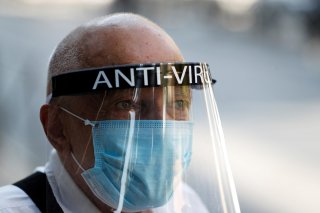How Do I Avoid Getting Coronavirus from Someone Who Lives with Me?
The person who is sick should eat separately from other members of the household, while their dishes should be washed using gloves and hot water.
Months into the coronavirus pandemic, most people know that if a friend or relative has tested positive for coronavirus, or even been exposed, that they’re supposed to isolate for as long as fourteen days. Even with a vaccine here, such isolation protocols remain in place.
But what are you supposed to do if that person lives with you?
The Centers for Disease Control (CDC) has offered guidelines for what to do if one person in a household has coronavirus, while the others do not.
“The sick person should separate themselves from others in the home,” the guidelines say. However, those who live with the person should continue to check on them in their isolation.
“If possible, have the person who is sick use a separate bedroom and bathroom. If possible, have the person who is sick stay in their own ‘sick room’ or area and away from others. Try to stay at least 6 feet away from the sick person.”
As for those who need to share space, people are advised to open windows, in order to maintain airflow, while also improving ventilation.
The person who is sick should eat separately from other members of the household, while their dishes should be washed using gloves and hot water.
“Handle any dishes, cups/glasses, or silverware used by the person who is sick with gloves. Wash them with soap and hot water or in a dishwasher,” the CDC advises of those in that situation. They should also not share dishes, cups, silverware, towels or other items with the sick person. People living in a house with someone who is sick with coronavirus should also regularly clean surfaces and other items.
In addition, the person who is sick should wear a mask, as should any caregivers who are in contact with that person.
Another set of guidelines, issued last month by the Cleveland Clinic, offers similar advice.
“Right now, we’re seeing a lot of infectivity in homes, where someone who’s sick infects other people they live with,” according to James Merlino, the chief clinical transformation officer for the Cleveland Clinic in Maryland.
Merlino was cited in the CDC article.
“If you can’t avoid close contact with the person in your home who is sick, the CDC recommends that you also stay home while they isolate and for 14 days afterward,” the clinic noted. “This will ensure that you don’t risk spreading COVID-19 to others outside of your home. Watch for a fever, cough, shortness of breath or other COVID-19 symptoms.”
“COVID-19 often gets in through the back door—it spreads when someone loosens up on precautions or when a family member isn’t careful,” Merlino added. “So we have to be very vigilant with these precautions.”
Stephen Silver, a technology writer for the National Interest, is a journalist, essayist and film critic, who is also a contributor to Philly Voice, Philadelphia Weekly, the Jewish Telegraphic Agency, Living Life Fearless, Backstage magazine, Broad Street Review and Splice Today. The co-founder of the Philadelphia Film Critics Circle, Stephen lives in suburban Philadelphia with his wife and two sons. Follow him on Twitter at @StephenSilver.
Image: Reuters

